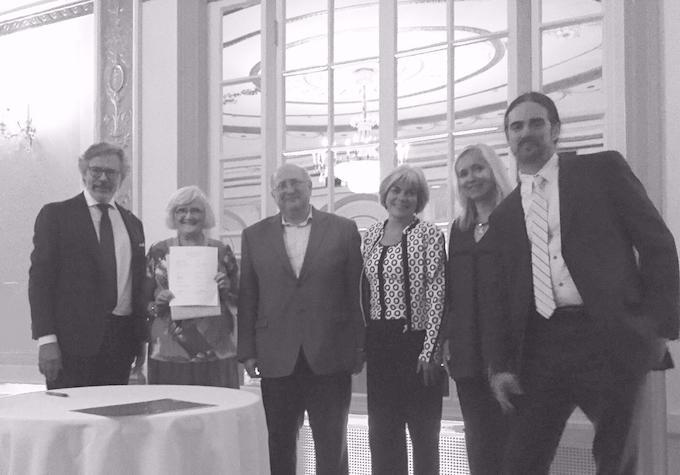About
IFOTES is an international federation founded in 1967 that brings together National Associations of Telephone Emergency Services which offer emotional support, immediately accessible to any person suffering from loneliness, in a state of psychological crisis, or contemplating suicide.

Vision and mission
IFOTES strives to promote, in all sectors of society, an attitude of mutual listening and the awareness of the importance of emotional health and listening skills.
IFOTES’ mission is to promote the work of helplines and the exchange of experiences amongst its national members by organizing congresses, trainings sessions and seminars, which contribute to the quality of the service offered.
It also supports all efforts to create telephone emergency service centres and national associations worldwide.
IFOTES maintains relationships with organizations sharing the same concerns, such as the World Health Organization (WHO), the International Association of Suicide Prevention (IASP), and the other international organisations of helplines, member of the World Alliance of Crisis Helpines (WACH).
Norms and Statutes
INTERNATIONAL NORMS OF LISTENING SERVICES
- Telephone Emergency Services are available, at any time, to any person wishing to make contact, regardless of his/her age, sex, religion or nationality.
- Any caller has the right to be listened to and respected regards of his/her beliefs, convictions and personal choices.
- Listening is offered in a welcoming and open attitude and the listener's golden rule is never to impose any obligation to the caller.
- The contents of a call are highly confidential within the Branches, especially with regard to any information pertaining to private lives.
- During a telephone conversation, the listener should remain strictly anonymous and the caller has the right to remain anonymous.
- Branches work on a voluntary basis, listeners having been selected, trained and supervised with a view to constantly improving their listening competence.
- Emergency Telephone Services are entirely free of charge to the caller.
Facts & Figures
mostly in Europe
are members of IFOTES
provide the listening service
support listeners with training and supervision and manage the crisis centers
for a total of 1.1 million hours of listening per year
every year
every year
meetings
Organization
Discover how IFOTES works: General Assembly, International Commmitee, Executive Committee, ...
ARTESS
Association for Research and Training on Emotional Support Skills
Read more
WACH
World Alliance of Crisis Helplines
IFOTES, Life Line International, Befrienders Worldwide, Lifeline Australia, De Leo Fund and National Suicide Prevention Lifeline created WACH (World Alliance of Crisis Helplines), a worldwide network which common aim is to:
• Improve access for people in distress to emotional support services
• Maximise impact of value of emotional support services through advocacy
• Increase information exchange, best practice and networking between members
• Offer training to promote the awareness of emotional health and suicide prevention
• Share information material
• Make joint presentations at international events
• Cooperate with other organisations that share the same concerns

A worldwide network for the promotion of helplines
The Memorandum of Understanding was signed in Montreal on June 16 2015, at the IASP congress.
WACH is now officially the global association for the promotion of the role and expertise of help lines.
The members of WACH have contributed to the handbook "Preventing Suicide - a resource for establishing a Crisis Line" which was published by the WHO in Spring 2019.
Milestones
FIRST HELPLINES IN EUROPE
The first help-line with volunteer listeners in Europe started in London in 1953, thanks to the original intuition of Rev. Chad Varah. The Association of “the Samaritans” was founded.
Other help-lines follow in the main European cities:
- 1956 - Telefonseelsorge in Berlin
- 1957 - Die Dargebotene Hand in Zurich
- 1958 - Telefonische Hulpdienst in Rotterdam
- 1958 - Kirkens Nattjeneste in Oslo
- 1959 - Tele-Accueil in Brussels
- 1960 - SOS Amitié in Paris
- 1963 - Telefono Amico in Florence
IFOTES START and DEVELOPMENT
The history of IFOTES is closely related to the prevention of suicide. It began in the 60s in Geneva and finally, after almost 7 years of exchanges between the founders, in 1967 IFOTES officially came into being. The Statutes and the International Norms were conceived and accepted by all members. They were reformulated in 1973 and readjusted in 1994, 2000 and 2010 but are still in force.
The founders allowed each member country to keep its own way of working, but prohibited all tendencies to influence the caller. In essence:
The Telephone Emergency Services are not a new social service but a particular attitude that cannot be found in talking to a minister, a doctor or a social worker.
Aims and methods of work were laid down and particularly the principles of the Federation. These dealt with important matters such as:
- the 24-hours availability of the services to people in distress who may be suicidal
- confidentiality
- the possibility for the caller to remain anonymous (whether he calls on the telephone or in person )
- the selection and the training of the volunteers
- the refusal to exercise pressure of any kind, whether religious, political or ideological on either callers or volunteers.
The countries represented in IFOTES in 1967 were: Austria, Belgium, Denmark, Finland, France, Italy, the Federal Republic of Germany, Great Britain, Norway, Sweden and Switzerland.
Other countries have joined IFOTES over the decades, and some have withdrawn, to form the present International Federation of 30 national Associations based in 20 countries.